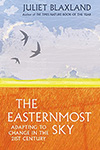|
THE EASTERNMOST SKY:
Adapting to Change in the 21st Century
by Juliet Blaxland |
 Juliet Blaxland is a rural architect and a Household Cavalry wife. Her previous book, The Easternmost House (reviewed in The Guards Magazine, Summer 2019 edition) used, as an allegory for a much broader and philosophical study of rural life, the inevitable fate of her house, perched on the Suffolk coast, on the easternmost edge of England. The eroding cliff crept closer and closer until the end came in early 2020, when the house was finally condemned by the Coastal Engineer, Bob, ‘an almost mythical person who had haunted our time on the cliff’ but who turned out to be a ‘lovely friendly and cheerful man’. By the time of its sad demise, this ‘architecturally unremarkable building’ had attracted a good deal of attention, primarily because of the success of the book, highlighting the threat of climate change. Juliet Blaxland is a rural architect and a Household Cavalry wife. Her previous book, The Easternmost House (reviewed in The Guards Magazine, Summer 2019 edition) used, as an allegory for a much broader and philosophical study of rural life, the inevitable fate of her house, perched on the Suffolk coast, on the easternmost edge of England. The eroding cliff crept closer and closer until the end came in early 2020, when the house was finally condemned by the Coastal Engineer, Bob, ‘an almost mythical person who had haunted our time on the cliff’ but who turned out to be a ‘lovely friendly and cheerful man’. By the time of its sad demise, this ‘architecturally unremarkable building’ had attracted a good deal of attention, primarily because of the success of the book, highlighting the threat of climate change.
This latest book, The Easternmost Sky, continues the theme of rural life in this remote coastal region of Suffolk, battered by the rising waters of the remorseless North Sea. The early part of the book describes the demolition of the house, and all the memories of the many people who had known it over the years. ‘What happens when a house dies and gives up its soul?’ For anyone who believes that a house absorbs something of the people and events associated with it, into the bricks and mortar of its existence, this is indeed a thought-provoking question.
In the course of the month-by-month chapters that continue the story, the author writes about the future of farming, hunting, shooting, rewilding, and many other topics, including even the occasional and interesting reference to the Household Division.
The author’s discussion of George Monbiot’s views about the ‘future of food’, predicting the end of traditional farming and that ‘all our food except fruit and veg will be produced by completely different means’ not reliant at all on animal-based foods, reminded me of a recent podcast discussion between the historians Dominic Sandbrook and Tom Holland. Recalling the era when vegetarianism and veganism were widely regarded as decidedly odd, they acknowledged that these are now seen as mainstream and respectable; so could there be a time when eating the flesh of animals would be regarded as deeply abhorrent? They had a point, and Juliet Blaxland, who lives in a place surrounded by traditional farmland, picks up some similar themes, suggesting that when it comes to ‘ethical food dilemmas ... eating only plants does not let anyone off the hook’ since ‘plant-based’ food ….. ‘comes with its own moral maelstrom of undesirable side effects’ …. such as ‘deforestation, water shortages and human rights issues’. Food for thought, to coin a phrase.
The author ‘zooms in and out’ to use her own expression, by talking about life in her rural environment, with plenty of engaging and illuminating anecdote along the way, while set within a much broader global canvas in which there has to be change …. if we are to survive. Change is both good, and indeed inevitable, however, the author suggests that Nature always has ‘the upper hand in the end’, and so there is a real sense that here we are, the human race, at something of a watershed.
During the Cold War, we didn’t really worry too much that the edge of the cliff was not far away since the threat of nuclear annihilation never seemed real, unless one was sitting at the console in the bunker. Now it is different, because the cliff, and not just the literal one along the Suffolk coast, is being eroded away, on all fronts, and for all sorts of reasons that are neither universally accepted nor understood. This seems now to be the real challenge for the human race, and it is one that Juliet Blaxland highlights in this fascinating book. If Nature always has ‘the upper hand in the end’, then it will survive with or without us. And we just won’t be around to enjoy the rural life so wonderfully described in this book, nor indeed the urban environment where many of us live.
The Editor
Published by Sandstone Press
Shortlisted for the 2021 East Anglian Book Awards
|
|